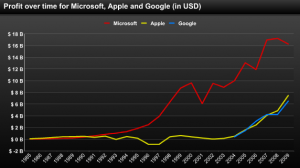Microsoft Monopoly Scandal
Prior to 1998, Microsoft was the main producer of the personal computer, PC, thus they decided to abuse their power and monopolize the market. The technicians created a code on the PCs that prevented the installation of a software program created by a company other than Microsoft.
The monopolization “violated local custom and law” (Freeman). Microsoft’s businessman failed to follow “the social responsibility of business [ethics by not] conforming to the basic rules of…society” (Friedman), by intentionally monopolizing the market with its PC designs. Cornering the market only benefited the company, thus they were not working in the customer’s best interest.
The exclusivity Microsoft generated was a strategic maneuver; however, monopolizing a nongovernment organization is an illegal and unethical move. Microsoft was aware of the laws of business, yet they continued to corner the computer software market. The process of inhibiting their competition from allowing their software to run on the PC was a very ingenious plan. The monopolization occurred during the beginning stages of the computer world, thus the fact that they had the knowledge to create a programming code that would prevent other programs to run on the PC is impeccable. Although monopolizing the market was an ingenious plan, the intentions Microsoft had were immoral in the business world.
Bibliography:
Friedman, Milton. “The Social Responsibility of Business Is to Increase Its Profits.” 1970.Corporate Ethics and Corporate Governance. N.p.: Springer, 2007. 171. Print.
“U.S. VS. MICROSOFT; Excerpts From the Ruling That Microsoft Violated Antitrust Law.” The New York Times. The New York Times, 04 Apr. 2000. Web. 12 Sept. 2013. <http://www.nytimes.com/2000/04/04/business/us-vs-microsoft-excerpts-from-the-ruling-that-microsoft-violated-antitrust-law.html?pagewanted=all>.
Websites:
http://site.ebrary.com/lib/ubc/docDetail.action?docID=10187339&page=171


1 thought on “Microsoft Monopoly Scandal”